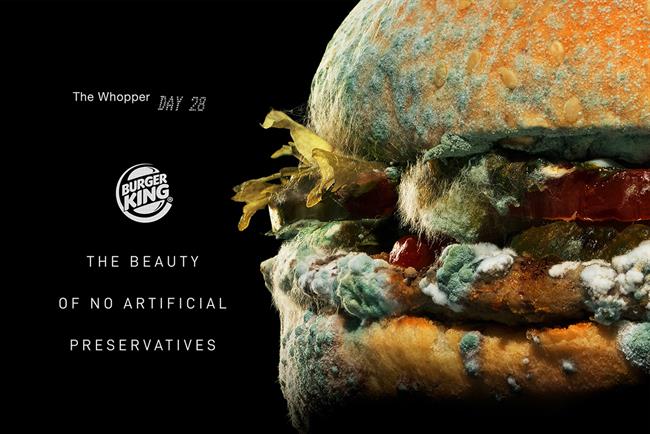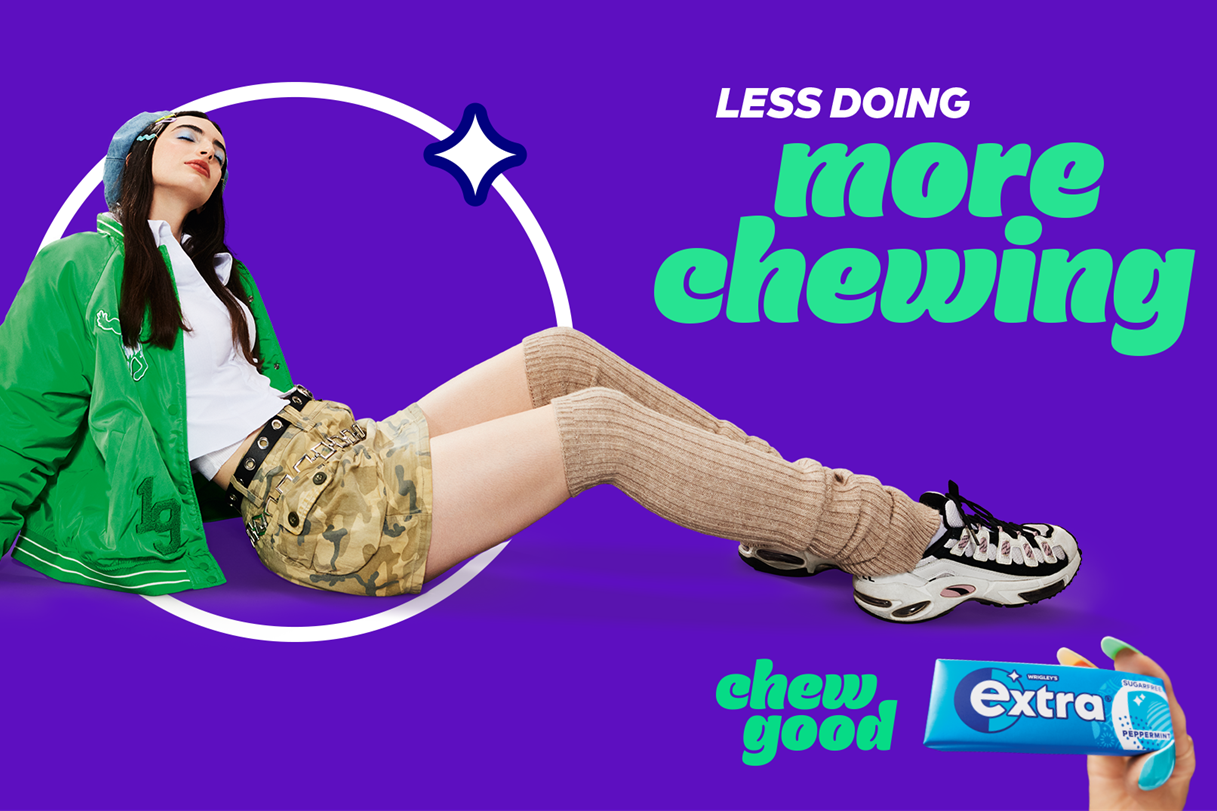With industry comments ranging from "This is hands down the dumbest creative idea I’ve ever seen" to "Burger King has already won 2020", the mouldy Whopper has got adland talking.
Shot in time lapse over 34 days as the burger is consumed by furry green fungus, the campaign is the latest in a long line of high-profile exploits taking aim at rival McDonald’s. And while there’s a 10-year-old McDonald’s burger and fries famously not decomposing in a glass cabinet in Snotra House, southern Iceland, the mouldy Whopper has a point to make. Its premise that "real food gets ugly" relies on shock tactics to underline that the Whopper will be free from artificial preservatives by the end of 2020 at all US restaurants.
Burger King’s previous swipes at McDonald’s range from the claim that every Whopper photographed in 2019 ads had a Big Mac hidden behind it to "The Whopper detour", with its mobile app redirecting McDonald’s customers to its own restaurants with the promise of a sandwich for one cent.
The latest campaign, created by David Miami, Ingo Stockholm and Publicis Spain, has been vilified and celebrated in equal measure. Some have criticised the brand for showing a disgusting mouldy version of its "hero" product, while others have argued that if it gets people talking, it’s good advertising.
Critics also suggest the work has been created primarily for adland’s gratification, with an eye on creative prizes. They’ve voiced doubts that harried consumers will realise the point of the campaign as they rush past it thinking how disgusting it looks.
"Some will criticise. Some will love. Everyone will notice. Risky is to do something no-one cares about. And in this specific case, we are really proud to be taking the right steps to improve the quality of our food," Fernando Machado, global chief marketing officer at Burger King, has said.
While rivals prefer a more aspirational, lifestyle approach to their campaigns, is Burger King’s long-term strategy of trolling its competitors making a difference in terms of sales or brand value?
McDonald’s has four times the market share of Burger King, according to BrandZ, which valued the McDonald’s brand at $130 billion and listed it as the world’s most valuable fast-food brand in 2019. By contrast, Burger King was valued at $7.1 billion and was the seventh most valuable fast-food brand.
So, do Burger King's shock tactics actually come from a place of brand desperation?
Andy Nairn, founder, Lucky Generals
Shock tactics are completely legitimate if the subject matter is itself shocking and the brand's connection with it authentic. So, for instance, if you're genuinely tackling climate change, discrimination, poverty, illness or injustice, then drawing people's attention to the problem can be powerful. You still need to show how you're helping alleviate the situation, though – otherwise you're simply exploiting bad news.
Where you're just borrowing disturbing imagery or using it gratuitously to sell stuff, then it's not only less defensible, it's less likely to be effective (as consumers will just remember the unpleasant imagery rather than the commercial message). I fear the Burger King ad might fall foul of this and leave a nasty taste in the mouth.
Ana Balarin, creative partner, Mother
In the wise words of Maya Angelou: "People will forget what you said, people will forget what you did, but people will never forget how you made them feel." Thanks to Burger King, I now feel disgusted. Gives a not-so-subtle whiff of awards addiction.
Ben Carter, global director of restaurants and strategic partnerships, Just Eat
The Burger King mouldy Whopper ad has certainly caught our imagination and so you could say by doing that it has done its job. The debate has raged; is this good, clever creative by being overtly provocative or is this more about a creative or a marketing director’s ego? Regardless, it has got us all talking, either in admiration or in disgust (I fall in the clever admiration camp).
Shock tactics from brands can be clever and can work – if there's real substance, meaning and purpose behind them. But it's dangerous and potentially disingenuous if a brand is just trying to do it to grab attention – and notoriety can come back to bite you. Who remembers the FCUK ads in the early noughties…
Anna Vogt, chief strategy officer, TBWA/London
Not all shocks are equal. There are smart shocks and lazy shocks. I love smart shocks. And I think we need more of them. Smart shocks are clever through truth. They enlist imagination. And pay endless attention to detail. They ultimately change how we think and act. Around topics like periods, plastic and preservative-free burgers.
Then there are lazy shocks. Lazy shocks make us look away and forget. The method overrides the message. Lacking in strategic framing, creative ambition or true bravery. But their biggest crime is that they don’t work.
Shock tactics don’t feel desperate when the message conveyed is shocking in itself. A public-health announcement with the message to stop doing something unhealthy or disastrous, or a purpose campaign that requires action from the public, must be shocking enough to promote the behaviour change required to remedy the issue.
But a fast-food company announcing that a burger is going preservative-free? Well, that one might reek a little. Especially in an age where we have come to expect our food to be natural and free from unnecessary colours or preservatives. It’s also a little suspicious on the heels of their not-for-vegetarians vegetarian burger launch…
Zaid Al-Zaidy, group chief executive, The Beyond Collective
Shock tactics are a legitimate way to get your audiences to pay attention and do something, but mostly when justified by a good cause, as elicited in decades of public health and charity advertising. But BK’s "mouldy burger" doesn’t really have a serious point to make beyond its own self-aggrandisement. To me, it is awards bait that could backfire. We "marketing pros" have the time, inclination and maybe even the duty to decode this execution fully and admire the brand’s confidence. But who is the true audience here and do they get it, let alone care about it? We’ve been taught not to underestimate the intelligence of our audience, but the industry still perhaps overestimates how much time people are willing to give to brands and their stories.
Vicky Bullen, CEO, Coley Porter Bell
Shock has its place in marketing and it’s not always delivered for desperation’s sake – but there is a line. Become too gratuitous and you risk losing relevance to the brand or brand story. Use it in a predictable way and you risk muting your message in a sea of sameness, especially in certain categories like the charity or public sector. Neither was the case for Burger King.
It’s tempting to think Burger King was looking to shock for shock’s sake with its mouldy burger advert. But we should remember the ad is simply one activation within a long-term brand-building campaign. Burger King’s strategy has been displaying the hallmarks of a disruptor brand and seeks to change perception of the brand in a fiercely competitive market disrupted by the wellness wave.
Fast-food joints are no doubt wondering what their place in the world is. After all, consumers are buying more organic products than five years ago, according to YouGov. With this in mind, Burger King’s divisive "mouldy burger" helps turn the norm on its head. By undressing its flagship burger product, Burger King has expertly showcased the authenticity of the ingredients in its products. And in the process, it’s reframed its competitors, made people view the brand in a different way and, of course, become noticed along the way.















